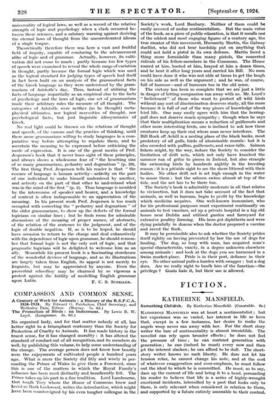COMPASSION AND COMMON SENSE.
A Century of Work for Animals : a History of the R.S.P.C.A. 1824-1924. By Edward G. Fairholme, Chief Secretary, and Wellesley Pain, Editor. (Murray. 7s. 6d.)
The Protection of Birds : an Indictment. By Lewis R. W. Loyd. (Longmans. 3s. 6d.) No organised body, and for that matter nobody at all, has better right to a triumphant centenary than the Society for Protection of Cruelty to Animals. It has made history in the
truest sense, for it has changed morality : it has altered the standard of conduct out of all recognition, and its members do well, by publishing this volume, to help some understanding of the change. The average person does not know how beastly were the enjoyments of cultivated people a hundred years ago. What is more the Society did fitly and wisely in per- suading the Prince of Wales to give them a Foreword, since this is one of the matters in which the Royal Family's influence has been most distinctly and beneficently felt. The Prince takes up his part in a fine tradition. Lord Lambourne, that tough Tory whom the House of Commons knew and loved as Mark Lockwood, writes the introduction, which might leave been countersigned by his even tougher colleague in the Society's work, Lord Banbury. Neither of them could be easily accused of undue sentimentalism. - But the main value of the book, as a piece of public education, is that it recalls one of the oddest and most engaging figures of a century ago, the true creator of this movement, Humanity Martin, the Galway duellist, who did not bear hardship put on anything that could not hold a pistol in its own defence. Martin faced a thing more formidable than many pistols, the concerted ridicule of his fellow-members in the Commons. The House roared at him, hooted at him, brayed at him a dozen times, and he beat it after long years and carried his Bill. No man could have done it who was not able at times to get the laugh on his side as well as the argument ; and he was, of course, full of humour—and of humours too in the old sense.
The victory has been so complete that we are just a little in danger of letting compassion run away with us. Mr. Loyd's " Indictment" of those who want to protect all wild birds without any sort of discrimination deserves study, all the more because it is full of out of the way pieces of knowledge about bird life. One may easily agree with him that the herring- gull does not deserve much sympathy ; though when he says that their multiplication means a reduction of guillemots and other more interesting birds, one is inclined to ask how these creatures keep up their end where man never interferes. The Bill Rock off Achill is a nesting place of the black backs, most predatory of all gulls, birds of abominable morals : but it is also crowded with puffins, guillemots, and razor-bills. Salmon fishers might, by the way, induce the Society to consider the limitation of drift nets, which not only have knocked the summer run of grilse to pieces in Ireland, but also strangle the swimming birds by hundreds nightly in the breeding season : it is a pitiable sight to see the shore littered with their bodies. No other drift net is set high enough in the water to noose them : but the salmon swims almost at top of the tide, and the net has to be there too.
The Society's book is admirably moderate in all that relates to vivisection, but it does not take account of the fact that animals, as well as humans, begin to profit by the knowledge which medicine acquires. One well-known immuniser, who for his professional purposes must experiment continually on animals to test vaccines, set up a private hospital in a big old house near Dublin and utilized garden and farmyard for extensive poultry farming. His hens got diphtheria and were dying painfully in dozens when the doctor prepared a vaccine and saved the flock.
It may be permissible also to ask whether the Society prides itself rightly on having prevented by law the use of dogs for hauling. The dog, so long with man, has acquired man's special characteristic, vanity, in a degree unknown elsewhere among animals : and look at the dogs you see harnessed in a Swiss market-place. Pride is in their port, defiance in their eye. No other animal pulls a burden with swagger : but a dog does. Are we really right to baulk him of the function—the privilege ? Goats hate it, but their use is allowed.






































 Previous page
Previous page